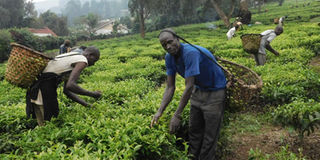Government to register tea factories, farmers

Agriculture. Farmers harvest tea leaves in Kabarole District. President Museveni has overtime urged Ugandans to embrace tea farming. PHOTO ALEX ASHABA
What you need to know:
Regulation. The move is aimed at producing quality tea.
Government and the Uganda Tea Association will begin registering all tea farmers next year to regulate their operations.
The authorities will also carry out geo-mapping of tea gardens to create a national tea data bank.
“It is a good idea to have all farmers in the country registered and as government, we shall support the registration of all tea farmers and geo-mapping of their gardens by looking for the remaining Shs500m to complete the exercise,” the State Minister for Agriculture, Mr Christopher Kibanzanga, said last Friday.
He was speaking at the launch for the profiling of small-holder tea producers and geo mapping of tea gardens in Fort Portal, Kabarole District.
The exercise is estimated to cost Shs1.6 billion with funding from the private sector and government.
Mr Kibanzanga said government will also formulate policy guidelines to regulate the sector.
“After coming from Christmas, the policy for the tea sector will be presented to Cabinet for final approval because in the tea sector, there are some people who still produce poor quality tea which is affecting our market and reducing foreign exchange earnings,” he said.
Uganda currently has 32 tea factories and tea is the second foreign exchange earner. Out of 32 tea factories, five are owned by small-holder farmers.
The minister warned that government will close all tea factories producing poor quality tea.
He tasked district agricultural officers and extension workers to monitor the factories to ensure quality.
The country produces 70,000 tonnes of tea annually and 90 per cent of it is exported to other countries.
The general manager of Igaara tea factory, Mr Onesimus Masiko, attributed the poor standard of tea to lack of laws that govern the tea sector.
Mr Masiko said profiling tea farmers in the will help authorities know where tea farmers and factories are located in order to be helped.
“We shall be helped to know the exact tea farmers who supply poor tea leaves and factories that buy poor quality,” he said.
Since August, tea prices have been dropping, especially in Bushenyi, Mitooma, Sheema, Rubirizi and Buhweju districts.
The farmers most of whom are shareholders of Igara factory, which has more than 7,000 members indicate that prices for the green leaf tea has been falling from Shs600 in August to Shs550 in September and then Shs470 in October.
Mr Jackson Byaruhanga, the factory field operations manager, said government had failed to put up a regulatory authority and mechanism in the sector which is abetting poor quality tea.
Mr Byaruhanga said Kenya and Rwanda were fetching better prices at the Mombasa Auction because they have priotised quality.




